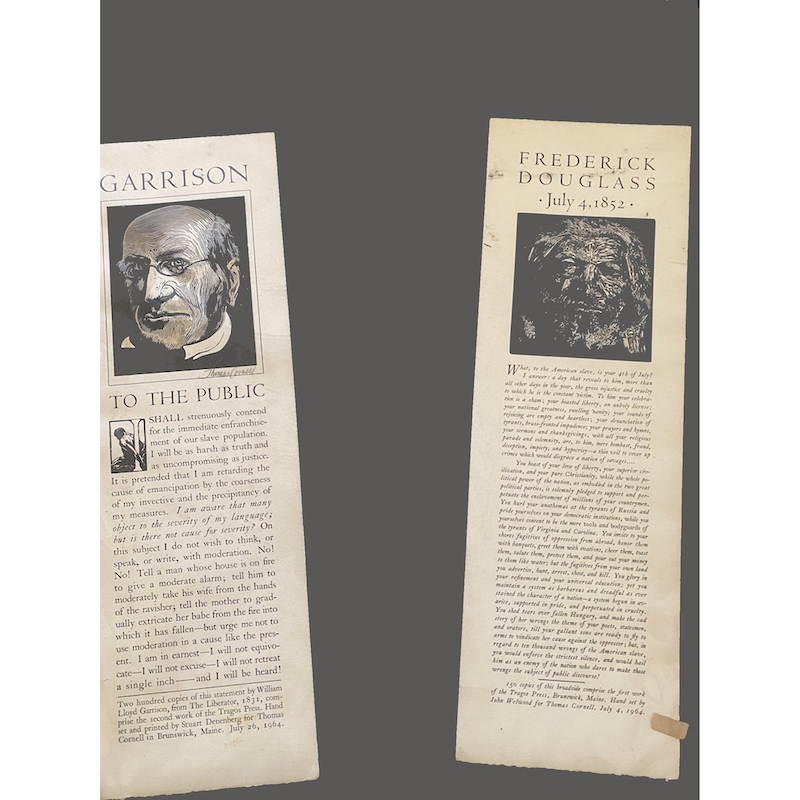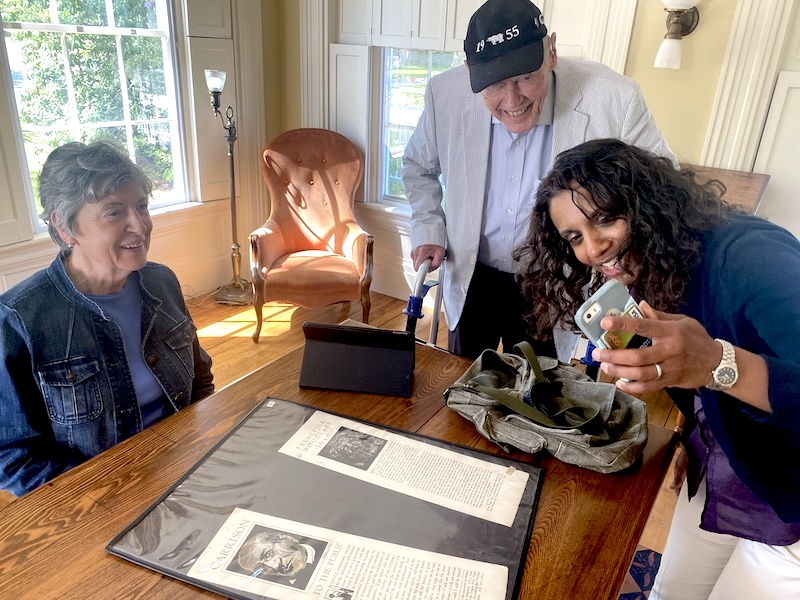Bowdoin Originals: 1960s Civil Rights Broadsides Come to Light
By Rebecca Goldfine
Wood prints of William Lloyd Garrison (1805–1879) and Frederick Douglass (1817–1895), by Thomas Cornell, 1964. Hand set and printed by Stuart Denenberg ’64 and John Welwood ’64.
They were printed on long, thin broadsides, which are one-sided sheets historically used for public proclamations. Underneath the men's faces were passages of some of their most impassioned words railing against the abomination of slavery.
What caught Anderson's eye in particular were the etched lines forming the countenances of the two men. Forceful yet graceful, these had been carved into wood blocks by Thomas Cornell, a professor of art at Bowdoin from 1962 until his death in 2012.
The broadsides, according to small print at the bottom of each one, had been hand set and printed in July 1964 by two of Cornell's students: Stuart Denenberg ’64 and John Welwood ’64.
Anderson, a government major who attended Harvard Law School and became an attorney, said recently that every time he looked at the artworks over the years, he thought he would like to donate them someday to Bowdoin. He had a record of contributing books and papers to Bowdoin already, including several volumes of the British Parliamentary Register for the Revolutionary War years that supplemented the copies James Bowdoin had given the College.
"You glory in your refinement and your universal education, yet you maintain a system as barbarous and dreadful as ever that stained the character of a nation—a system begun in avarice, supported in pride, and perpetuated in cruelty."
— Frederick Douglass, writer, orator, statesman, and social reformer
This year, he finally decided to do so. He contacted Tess Chakkalakal, who is Bowdoin's Peter M. Small Associate Professor of Africana Studies and English and chair of the Africana studies department. She met him in person to receive the gift at the Harriet Beecher Stowe House, which is where the framed broadsides will likely be hung. The house, on Federal Street in Brunswick, is where Stowe lived with her family while she wrote Uncle Tom's Cabin.
Stowe also sheltered John Andrew Jackson, a fugitive slave from South Carolina, in the house. Today, the building is owned by Bowdoin College and is a National Historic Landmark and a National Underground Railroad Network to Freedom site.
Additionally, in the process of donating the Garrison and Douglass prints, a third broadside of civil rights leader Bayard Rustin resurfaced. Also made by Cornell and his students, Rustin's piece, which is larger than the other two, will be hung between Garrison and Douglass, forming "a civil rights triptych of three important civil rights heroes," Chakkalakal said.
Denenberg, who runs an art gallery in West Hollywood, credits Cornell with not only introducing him to art but also opening his eyes to the urgency of achieving social justice. "I came to Bowdoin College in 1960 as a young freshman, and I met immediately the most charismatic person in the entire college, Thomas Cornell," he reminisced recently on a video call. "I wasn’t particularly interested in a career in art at that time at all."
But when he enrolled in a printmaking course with Cornell, his career trajectory was set into motion. In 1965, he opened his first gallery and is now an international art dealer. All due to "a passion ignited by Tom," he said.
Following the back-to-back visits of Rustin and Martin Luther King Jr. to the College on May 5 and 6 in 1964, Cornell invited Denenberg and Welwood to collaborate with him on a civil rights printing project.
"I will be as harsh as truth and as uncompromising as justice...I will not equivocate—I will not excuse—I will not retreat a single inch—and I will be heard!"
—William Lloyd Garrison, founder of The Liberator, an anti-slavery newspaper
"John and I were interested in the political possibilities, and of physically making a statement in the opportunistic language of the broadsides," Denenberg said. "We were children of the '60s." (Welwood, a pioneer in East-West psychology, died in 2019.)
They printed between 150 and 200 copies of each portrait. "We wanted these things to circulate," Denenberg said. "It was the time of the Vietnam War, and there was this consciousness of American militarism and systemic racism. We were going to change the world."
